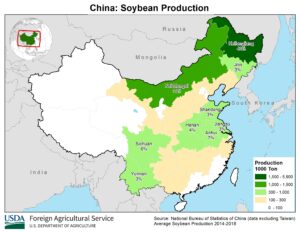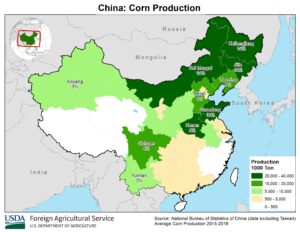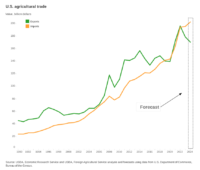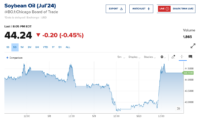Bloomberg's Clarice Couto reported this past Friday that "a surprising tax change in agriculture powerhouse Brazil has the potential to make soy grown in the world’s largest bean exporter less…
China Keeps Eye on Domestic Food Security
Earlier this week, Reuters writers David Stanway and Muyu Xu reported that, “China’s ambitious low-carbon goals should not come at the expense of energy and food security or the ‘normal life’ of ordinary people, President Xi Jinping said, signalling a more cautious approach to climate change as the economy slows.”
The Reuters article stated that, “‘Reducing emissions is not about reducing productivity, and it is not about not emitting at all,’ Xi was quoted by state news agency Xinhua as saying.
“‘We must stick to the overall planning and ensure energy security, industrial supply chain security and food security at the same time as cutting carbon emissions,’ he said.”
And on Thursday, Bloomberg writer Alfred Cang reported that,
China has kicked off a long-anticipated overhaul of its massive state-owned agriculture companies to help secure food supply for the world’s most populous nation.
“Food giant Cofco Corp. and national stockpiler China Grain Reserves Group, also known as Sinograin, will set up two joint ventures. The first is a grain storage business to be controlled by Sinograin, and the second for oilseed crushing and processing will be managed by Cofco.”
“The revamp has been considered since at least 2019 and is part of President Xi Jinping’s drive to streamline industrial capacity among state-owned companies. It will take Cofco closer to its ambition of rivaling the storied ‘ABCD’ group of international commodity traders who dominate flows of agricultural products — Archer-Daniels-Midland Co., Bunge Ltd., Cargill Inc. and Louis Dreyfus Co,” the Bloomberg article said.
Also this week, Reuters writer Dominique Patton reported that, “China’s agriculture ministry will promote intercropping of soybeans with corn on more than 1 million hectares of land this year, it said on Wednesday, seeking to boost output of the oilseed without reducing production of corn.

“China, the world’s top soybean importer, said late last year that increasing its output of the oilseed was a political priority, but it has given little detail on how it will achieve an increase.
“Output fell 16% in 2021 from the previous year, as some farmers switched to more profitable crops like corn.”

Patton explained that, “China has often cited the need to boost domestic output of soybeans in recent years to secure grain security and cut reliance on imports from the United States.
“It is targetting production of about 23 million tonnes of soybeans by the end of 2025, up 40% from current output levels of 16.4 million tonnes, according to a recently published plan.”
And a separate Reuters article this week by Dominique Patton stated that, “China has published trial rules for the approval of gene-edited plants, paving the way for faster improvements to crops.
“The new guidelines, published by the Ministry of Agriculture and Rural Affairs late on Monday, come amid a raft of measures aimed at overhauling the country’s seed industry, which is seen as a weak link in efforts to ensure national food security.
“Beijing has also recently passed new regulations that set out a clear path for approval for genetically modified (GM) crops.”
The Reuters article noted that, “While Beijing is expected to allow the planting of GM corn as early as this year, it may soon promote gene-edited crops too.
“The country’s research institutes have already published more research on market-oriented gene-edited crops than any other country, according to Rabobank.”







